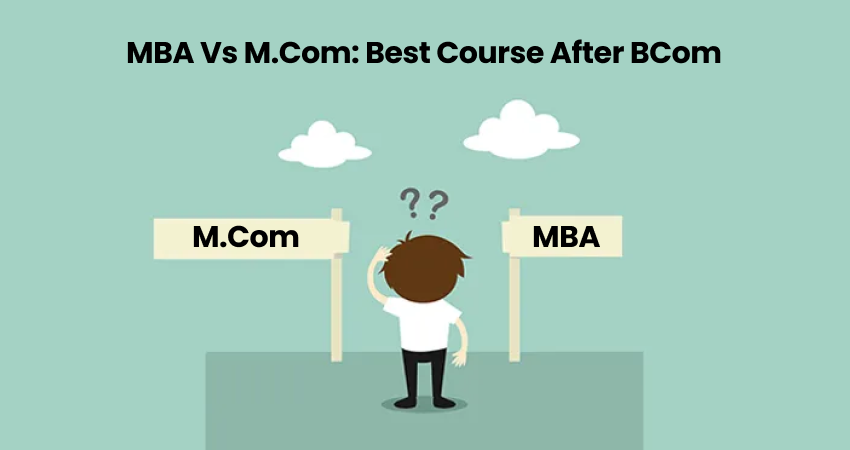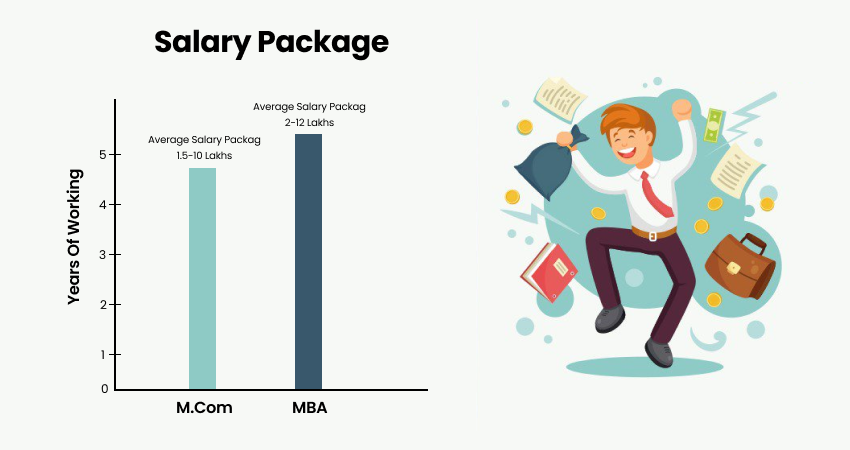B.Com is one of the most popular and in-demand courses that most students decide to pursue after completing school.
Furthermore, after graduation, they get a plethora of rewarding career options to pursue in order to shine brightly in the job market.
If you’re planning to pursue a master’s degree after graduation through B.Com, MBA vs M.Com are courses that confuse most of the students. These two are the best options that pave the way for huge career opportunities and job prospects.
This article provides a complete guide on MBA vs M.Com and helps you choose the best for your career growth.
MBA
The MBA curriculum provides a broad overview of all key business disciplines – marketing, finance, human resources, operations, etc. The first year focuses on building a strong base across all these areas while the second year allows you to specialize in a chosen field like marketing, finance, HR, etc. The coursework focuses more on application of concepts rather than just theoretical knowledge. Case studies and projects form an integral part of the MBA pedagogy.
M.Com
The M.Com syllabus goes in-depth into specialized branches of commerce and finance such as accounting, statistics, tax, auditing, etc. The emphasis is more on developing analytical skills and gaining thorough conceptual knowledge. The pedagogy focuses on classroom teaching and written examinations rather than practical application. The course does not provide much flexibility in terms of electives and specializations compared to an MBA.
Difference Between MBA and M.Com
| Aspect | MBA | MCom |
|---|---|---|
| Focus | Business and Management | Commerce and Trade |
| Core Subjects | Finance, Marketing, Operations, HR, Strategy, etc. | Accounting, Finance, Economics, Taxation |
| Duration | Typically 2 years | Typically 2 years |
| Entry Requirement | Bachelor’s degree in any discipline | Bachelor’s degree in Commerce or related field |
| Specializations | Wide range (e.g., Finance, Marketing, Operations) | Often offers specializations within Commerce |
| Course Structure | Integrates case studies, projects, and teamwork | Emphasizes theoretical and practical knowledge |
| Career Paths | Diverse – Management, Entrepreneurship, Consulting | Primarily in finance, accounting, and taxation |
| Skills Developed | Leadership, Strategic Thinking, Business Analysis | Financial Analysis, Accounting, Auditing |
| Job Opportunities | Management roles across various industries | Financial Analyst, Accountant, Auditor |
| Global Orientation | Often has an international perspective | Generally more focused on local and national markets |
| Networking | Extensive networking opportunities | Networking within commerce and finance circles |
| Industry Connections | Strong ties with corporate partners and alumni | May have connections with financial institutions |
| Experiential Learning | Internships, consulting projects, real-world cases | Practical exposure through internships and projects |
| Cost | Typically higher tuition fees | Generally lower tuition fees |
| Learning Style | Emphasizes leadership, teamwork, and innovation | Focuses on detailed subject-specific knowledge |
| Global Job Market Access | Generally better access to international job markets | May be more regionally oriented in job placement |
MBA Vs M.Com: Best Course After B.Com

Masters of Business Administration is a two-year program open to everyone who has graduated from high school.
Renaissance University offers MBA programs at a truly global educational institution in a variety of specializations such as finance, marketing, human resources, information technology, and others.
Students who have completed their B.Com degree can pursue an M.Com specialization.
The M.Com program is not as well-known as the MBA program, but it is a respected course that focuses on accounting and commerce. Students can enhance their career prospects by also studying ICWA or. Banking, accounting, finance, economics, statistics, and other subjects are covered in the M.Com curriculum.
Generally, M.Com programs are less expensive than MBA programs.
Here are few differentiator between MBA vs M.Com:
1. Career scope
Most students opt for an MBA to work in a gigantic organization with a high salary package or to kickstart their startups. Working in a high-profile job requires managerial skills besides learning accounting, finance, business management, corporate governance, statistics, and supply chain management.
Students of School of Management at Renaissance University, one of the top-rated MBA institutions, offer excellent placement and are a great place to learn and hone skills.
An MBA graduate can look for jobs in the corporate sector that include Chief Financial Officers, Accounting Managers, Financial Analysts, Financial Managers, Traders, HR Managers, Risk and Insurance Managers, Investment Banking and many more.
MCom graduates can apply for a variety of government and private jobs, which include financial planning and advisory, insurance, stock market, financial service sales, banking, and taxation.
Furthermore, after earning an M.Com degree , students can apply to doctoral programs or can pursue a career as a professor or researcher. Auditing, accounting, banking and finance, retail, fund management, and management consulting are all options for M.Com students.
2. Salary Package
Salary is yet another crucial factor when determining which course to opt for after completion of BCom Course.
MBA programs have an average salary package of Rs. 2 lakhs to Rs. 12 lakhs.
It massively depends on the university from which you’re pursuing. If you’re studying at a top-notch business school, odds are high that your salary package can go up to Rs. 24 L per annum.
MCom offers an average salary package starting at Rs. 1.5 L and can extend up to Rs. 10 L per annum.
Besides, the salary package highly depends on which university you have enrolled in and the company where you’re recruited.

3. Skill Set
Generally, all degrees require technical skills, which are quite essential in a job. The technical skillset massively differs between the MBA and M.Com.
In an MBA, a candidate has to be proficient in using the latest analytics software and should be well-versed in using the latest technologies. In addition, candidates should also understand the technical operations business.
While in M.Com, the required technical skills for a candidate are well-versed in finance, accounting, and taxation and they should be able to understand analytical and statistical software.
4. Nature of Job
A brief overview of job and career prospects can help you decide which course to take and what career and job opportunities you can expect from the course.
MBA jobs can include both desk work and fieldwork. The MBA degree leads to high profile jobs resulting in more responsibilities.
There will be times when you meet with clients, sell products and services, and participate actively in the operation and there will also be times when you will be conducting research, analyzing data, making presentations, and interacting with management.
Most M.Com graduates end up in desk jobs with little or no fieldwork. However, what they do is critical to the department and company in which they work.
Accounting, taxation, and finance professionals will have significant responsibilities. There are some professions, such as teaching, professor, and lecturer, that require you to be very active. However, most jobs for MCom graduates are not high-pressure, and one can have a good career.
Cost and Duration of MBA Vs M.com
MBA
Top MBA programs are expensive with costs ranging from ₹7 lakhs to ₹20 lakhs for the overall course. Self-financing options can reduce costs significantly. The program duration is 2 years full-time. Part-time or distance learning MBA can be completed over 3-4 years.
MCom
MCom programs have relatively lower course fees compared to MBA. Costs can range from ₹50,000 to ₹3 lakhs based on the college and program. The course duration is 2 years. Part-time options are also available.
Pros and Cons of Pursuing an MBA after B.Com
The Master of Business Administration (MBA) is a prestigious and sought-after qualification that promises to open doors to lucrative career opportunities. However, like any significant decision, it comes with its own set of advantages and challenges. In this article, we will explore the pros and cons of pursuing an MBA after completing a Bachelor of Commerce (B.Com) degree.
Pros:
- Enhanced Career Opportunities: Pursuing an MBA after B.Com significantly broadens your career horizons. It equips you with the skills and knowledge needed to take on leadership roles in various industries, including finance, marketing, human resources, and operations.
- Specialization and Expertise: An MBA allows you to specialize in a specific area of business, providing in-depth knowledge and expertise. Whether it’s finance, marketing, or entrepreneurship, you can tailor your MBA to align with your career goals.
- Networking Opportunities: Business schools often serve as hubs for networking. Through an MBA program, you have the chance to connect with industry professionals, alumni, and fellow students. These connections can be invaluable in terms of career advancement and business collaboration.
- Personal Growth and Development: An MBA is not just about academic learning; it’s a transformative experience that fosters personal growth. The challenges presented in an MBA program encourage critical thinking, problem-solving, and effective communication – skills essential for success in the business world.
- Higher Earning Potential: Statistics consistently show that MBA graduates tend to earn higher salaries than those without an advanced degree. The investment in an MBA education often pays off in the form of increased earning potential over the course of one’s career.
Cons:
- Financial Investment: Pursuing an MBA can be a substantial financial commitment. Tuition fees, living expenses, and the opportunity cost of not working during the program can add up. It’s crucial to carefully evaluate the return on investment and consider how long it will take to recoup the costs.
- Work Experience vs. Immediate Pursuit: Some argue that gaining work experience before pursuing an MBA is more beneficial, as it allows individuals to apply theoretical knowledge to real-world situations. Opting for an MBA immediately after B.Com may mean sacrificing valuable work experience.
- Saturated Job Market: The job market for MBA graduates can be competitive, especially in popular specializations. While an MBA can open doors, it doesn’t guarantee a job. Networking, internships, and a strong resume are still essential for securing coveted positions.
- Intensive Workload and Stress: MBA programs are known for their demanding schedules and intense workload. Balancing coursework, group projects, and often a part-time job or internship can be challenging and stressful.
- Changing Career Trajectory: While an MBA can enhance career opportunities, it may also shift your career trajectory. If you have a clear vision of your career path, ensure that an MBA aligns with your goals rather than diverting you into a different direction.
Pros and Cons of Pursuing an M.Com after B.Com
The academic journey from B.Com to M.Com is a pivotal crossroads in a student’s life, marked by the decision to delve deeper into the realms of commerce and business. While this advanced degree offers a plethora of opportunities, it’s essential to weigh the pros and cons before embarking on this educational adventure.
Pros:
-
Specialization and Expertise:
Pursuing an M.Com allows students to specialize in a specific area of commerce, such as finance, accounting, or marketing. This specialization provides in-depth knowledge and expertise in a chosen field, making graduates highly skilled and sought after by employers.
- Career Advancement:
An M.Com degree can significantly enhance career prospects by opening doors to higher-level positions. Many leadership and managerial roles require advanced qualifications, and an M.Com can be the key to climbing the corporate ladder.
-
Networking Opportunities:
Graduate programs often provide excellent networking opportunities. Interacting with professors, industry professionals, and fellow students can create valuable connections that may prove beneficial in the professional world.
-
Global Recognition:
An M.Com degree is internationally recognized, making it advantageous for those aspiring to work in a global business environment. It adds a layer of credibility and can facilitate opportunities for international career growth.
-
Research and Analytical Skills:
The curriculum of an M.Com program typically involves extensive research and analytical projects. This hones critical thinking skills, equipping graduates with the ability to analyze complex business scenarios and make informed decisions.
Cons:
-
Financial Investment:
Pursuing an M.Com involves a significant financial investment, including tuition fees, books, and living expenses. It’s crucial to consider whether the potential benefits outweigh the costs, especially in the context of one’s financial situation.
-
Time Commitment:
The duration of an M.Com program is generally longer than undergraduate studies. Balancing academic commitments with personal and professional responsibilities can be challenging, particularly for those who wish to enter the workforce sooner.
-
Limited Work Experience:
While an M.Com provides advanced theoretical knowledge, some argue that it may not offer the practical experience gained through on-the-job learning. This can be a disadvantage for those who value hands-on experience in their chosen field.
-
Saturated Job Market:
Depending on the specialization, graduates may find themselves entering a competitive job market. It’s essential to research industry trends and demand for specific skills to ensure that the chosen specialization aligns with market needs.
-
Changing Career Goals:
Pursuing an M.Com assumes a clear career path, but individuals may find their aspirations evolving during the course. This can lead to a mismatch between academic qualifications and career goals, raising questions about the relevance of the degree.
Which course should you choose – M.com Vs MBA?
Both courses are fantastic and serve specific functions. However, the following comparison will show which option is better. It will help you clarify which one is better in MBA vs M.Com.
- Cost – When compared to an MBA, an MCom is significantly less expensive. If you want to pursue an MBA, you must plan your finances carefully.
- International Value – An MBA degree has international value and can land you a job in another country. However, an MCom degree has no international value.
- Value for Money – While the MCom is less expensive than the MBA, the MBA is more valuable because you will get a high-paying job right away.
To summarize, an MBA is preferable for those interested in wider business management roles across diverse industries. The cost is higher but so are the long-term career prospects. MCom is more suited if you want to specialize in finance, accounting or taxation fields. The course is affordable and duration is similar to MBA. Evaluate your interests, career goals and budget before choosing between the two post graduate options after your B.Com.
Frequently Asked Questions
1. What is the fundamental difference between an MBA and MCom?
- An MBA (Master of Business Administration) focuses on developing managerial and leadership skills, covering a broad spectrum of business functions. On the other hand, MCom (Master of Commerce) is more specialized in finance and commerce-related subjects.
2. What are the career prospects after completing an MBA?
- An MBA opens doors to various managerial roles in industries such as finance, marketing, human resources, and operations. Graduates often pursue careers as business analysts, consultants, project managers, or even entrepreneurs.
3. How does an MCom degree impact career choices?
- MCom graduates typically find opportunities in fields such as accounting, auditing, taxation, and financial analysis. They may work as accountants, auditors, financial analysts, or in roles related to financial management.
4. Which course is more suitable for someone interested in entrepreneurship?
- An MBA is generally considered more suitable for individuals interested in entrepreneurship as it provides a comprehensive understanding of business strategies, leadership, and innovation.
5. Can I pursue an MBA without work experience?
- Many MBA programs prefer candidates with work experience, but there are also programs that accept fresh graduates. However, having some work experience often enhances the MBA learning experience.
6. Is MCom a better choice for those who want to specialize in finance?
- Yes, MCom is often a preferred choice for individuals seeking specialization in finance. The curriculum is tailored to provide in-depth knowledge of financial concepts, making it suitable for careers in accounting and finance.
7. How do the costs of pursuing an MBA and MCom compare?
- Generally, MBA programs tend to be more expensive than MCom programs due to the broader scope and often longer duration. However, the return on investment can vary based on career outcomes.
8. What are the admission requirements for MBA and MCom programs?
- Admission requirements vary among institutions, but both typically require a B.Com or equivalent degree. MBA programs may also consider work experience, GMAT/GRE scores, and letters of recommendation.
9. Can I switch from an MCom to an MBA program or vice versa?
- While it is possible to switch between programs, it may depend on individual circumstances, the university’s policies, and the compatibility of the coursework. Some credits may be transferable.
10. Which course provides better networking opportunities?
- MBA programs often provide extensive networking opportunities due to the diverse backgrounds of students and the emphasis on building professional connections. However, networking can also be valuable in MCom programs, particularly in finance-related industries.








